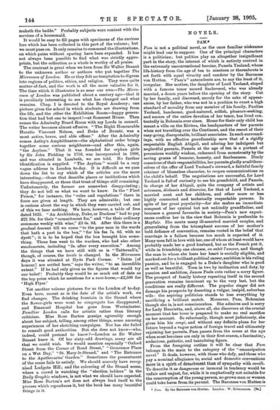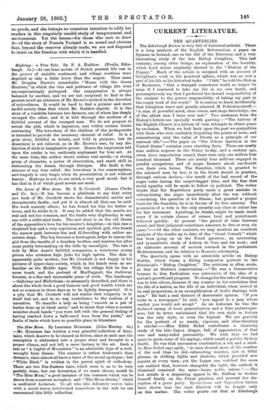Pam is not a political novel, as the once familiar
nickname might lead one to suppose. One of the principal characters is a politician; but politics play an altogether insignificant part in the story, the interest of which is entirely centred in the extremely unconventional heroine, Pamela Yeoland, whose life-history from the age of ten to nineteen or thereabouts is set forth with equal vivacity and candour by the Baroness von Hutten. "Pam's" antecedents are, to say the least of it, irregular. Her mother, the daughter of Lord Yeoland, eloped with a famous tenor named Sacheverel, who was already married, a dozen years before the opening of the story. Cut by her family, and disowned, merely for the sake of appear- ances, by her father, who was not in a position to exact a high standard of morality from any member of his family, Pauline Yeoland, handsome, good-natured, selfish, pleasure-seeking, and secure of the entire devotion of her tenor, has lived con_ tentedly in Bohemia ever since. Home for their only child has meant a villa on the Riviera, the headquarters of her parents when not travelling over the Continent, and the resort of their easy-going, disreputable, brilliant associates. In such surround- ings, with no effective guardianship save that of a rigidly respectable English Abigail, and adoring her indulgent but neglectful parents, Pamela at the age of ten is a portent of precocious worldly wisdom, redeemed from monstrosity by the saving graces of humour, honesty, and fearlessness. Dimly conscious of their responsibilities, her parents gladly avail them- selves of the offer of Lord Yeoland's steward, a faithful family retainer of blameless character, to reopen communications on the child's behalf. The negotiations are successful, for Lord Yeoland is full of curiosity to see his grandchild, and Pamela, in charge of her Abigail, quits the company of artists and actresses, declasses and divorcees, for that of Lord Yeoland, a married aunt and her children, and other more or less highly connected and technically respectable persons. In spite of her great popularity—for she makes an immediate conquest of her cynical but not unkindly grandfather, and becomes a general favourite in society—Pam's new experi- ences confirm her in the view that Bohemia is preferable to Mayfair. She meets many ill-assorted married couples, and generalising from the triumphant success of her mother's bold defiance of convention, remains rooted in the belief that marriage is a failure because too much is expected of it. Many men fall in love with her, one of whom at least would have probably made her a good husband, but as the French put it, while in friendship one chooses, on cubit l'amour, and though the man to whom she loses her heart is socially eligible, and marked out for a brilliant political career, ambition is his ruling passion, and be is engaged to a Duke's daughter who is good as well as beautiful. Torn in two by inclination and duty, by passion and ambition, James Peele cuts rather a sorry figure. The prospect of family history repeating itself in the second generation remains imminent up to the very last, but the conditions are really different. The popular singer did not damage his prospects by deserting a vulgar, insipid, suburban wife : the aspiring politician stands to lose everything by sacrificing a brilliant match. Moreover, Pam, Bohemian though she is, is not conscienceless. She admires and is sorry for Lady Henrietta, and, above all, she discovers at the crucial moment that her lover is prepared to make no real sacrifice on her account. So reluctantly, though most judiciously, she gives him his conga, and without any definite plans for her future beyond a vague notion of foreign travel and ultimately rejoining her parents, Pam passes from the scene at the age when most heroines are only in their first season, a fascinating, audacious, pathetic, and tantalising figure.
From the foregoing outline it will be clear that Pam belongs in the main to the category of the "emancipation
novel." It deals, however, with those who defy, and those who pay a nominal allegiance to, social and domestic conventions more in a spirit of detachment than of sympathy with revolt. To describe it as dangerous or immoral in tendency would be unfair and unjust, for, while it is emphatically not suitable for the consumption of the young person, no grown man or woman could take harm from its perusal. The Baroness von Hutten is
• Pam. By the Baroness von Hutton. London . W. Heinemann. [136.]
no prude, and she betrays no conscious intention to edify her readers in this singularly candid study of temperament and environment. Yet the lesson—for those who care to draw it—of the story of Pamela Yeoland is so sound and obvious that, beyond the• reserves already made, we are not disposed to insist on the freedom with which it is handled.























































 Previous page
Previous page